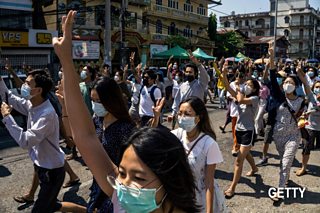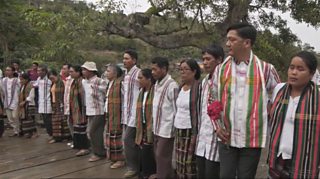'Thoughts of my Burmese friends haunt me still' - reflecting on Myanmar
Dipak Bhattarai
Series producer, Βι¶ΉΤΌΕΔ Media Action Myanmar
Tagged with:
Βι¶ΉΤΌΕΔ Media Action Myanmar Series Producer Dipak Bhattarai was working in Yangon when the military coup took place in the early morning of 1 February. He reflects on the experience of living under a military-controlled Myanmar, and what it means for the journalists and friends who remain there.
It was not even 5 o’clock in the morning. I was getting ready for my morning walk when I got a call from a colleague. Surprised by her call so early in the morning, I picked it up with some dread.
She said, “I think Aung Sang Suu Kyi and President Win Myint have been arrested. One of the NLD members has posted it on his Facebook.”
I didn’t go for my morning walk that day. I started calling my colleagues instead.
I knew what would happen next. Sixteen years before, to the day, in 2005, I was a reporter in Kathmandu when the Nepali King Gyanendra fired Nepal’s elected prime minister and declared a state of emergency. From experience, I knew that phones and internet would quickly be restricted. I hurriedly messaged my manager, country director and my daughters in Nepal, called my family members, and dropped a message into my Nepali diaspora Facebook Messenger group.
Information started to surface as my internet connection held on for a few more hours. But when the phone networks went down, I went out to see the situation for myself, and to purchase what supplies I could from the nearest vegetable market. Grocery shops and markets were full of panicked people rushing from one shop to another, trying to purchase rice, oil, salt and lentils.
'Stay at home and be safe'
In my broken Burmese, I tried to converse with a few people. I asked if they knew why my phone had stopped working. But almost everyone was hesitant to answer – having experienced military government from 1962 to 2011, many Burmese are reluctant to speak about politics or to criticise the authorities. Finally, a vendor who knows me said in a hushed tone, “Aung Sang Suu Kyi has been arrested by the military. All TV and radio connection has been cut. You should stay at home and be safe.”
My internet and phone started working again that afternoon, and I watched the military-controlled television channel as General Min Aung Hlaing addressed the nation to announce the military had taken power following what he called election irregularities, and declared a one-year state of emergency.
Burmese people started banging pots and utensils at 8 pm every night after the second day of coup, as loudly and piercingly as they could, in a traditional practice meant to chase the devil away. Photos and film clips began to go viral on social media – and the government soon declared the use of Facebook, Twitter and Instagram illegal in Myanmar. All radio and television, apart from those owned by government, were shut down.
In Myanmar, Facebook is analogous to the Internet, so widespread is its use. With it banned, people were deprived of information.

People protest in Yangon following a military takeover in Myanmar. Credit: Getty Images
Livestreaming arrests
For a few weeks, the protests continued, and quickly grew from a few hundred to hundreds of thousands. They were joined by government officers, bank employees and even medical staff. By the coup’s third week, Myanmar was at a near-standstill, with shopping malls closed, demonstrations throughout the day and curfews imposed at night.
In turn, the security forces became more aggressive, with reports of many night-time arrests, and the use of stun grenades and live ammunition on demonstrators and during house-to-house searches. Large demonstrations turned into local neighbourhood protests; human rights organisations say security forces have been using extreme violence in cracking down on these gatherings. By the beginning of May, a monitoring group reported more than 760 people had been killed and nearly 4,000 remain in detention.
Over the last three months, the military has shut down internet access at night and has periodically blocked mobile data communication. Access to information is curtailed and access to social media platforms regularly blocked. Some journalists have been using social media to livestream arrests and harassment by the military, but intermittent shutdowns make it harder to share and access that information.
Local journalists threatened
The safety of journalists is under threat, both in the larger cities such as Yangon and Mandalay, and in ethnic areas where there are few national or international journalists. I have worked closely with local journalists from my work filming in these areas for our Βι¶ΉΤΌΕΔ Media Action TV series Khan Sar Kyi (Feel It), which brought leaders to meet and discuss major issues with local communities. Many of my journalist friends are now in hiding for fear of arrest.
They have spent years reporting from the front lines of ethnic conflict, and have skills and experience in negotiating and reporting on conflict in a high-risk media environment. However, most of these agencies are small, local operations that are an easy target for search, raid and arrest procedures from local authorities and security forces.
This month, while the world marked World Press Freedom Day, I counted the number of my Myanmar journalist friends who are detained, or fleeing. Over 70 have been arrested; 30 of those have been released, and more than 40 have been prosecuted. At least 20 more still face arrest warrants for doing their job. Some journalists now face charges under the Penal Code that carry a maximum sentence of up to three years in prison. Six media outlets’ licenses have been revoked, including two popular TV channels which were broadcasting Khan Sar Kyi.
Yet amidst the current crisis, the Myanmar public has adapted swiftly to the changing media landscape. They are using a range of virtual private networks (VPNs) that allow them to circumvent blocks on Internet and social media, and they switch between encrypted messaging apps to share information safely and discreetly. With trusted independent TV and radio channels now largely blocked and struggling to reach their audiences, people are turning to social media for news, to watch events unfold in real-time, and to organise protests. These young, often first-time voters are still ready to risk their lives for democracy.
The echo of bullets
I write this now from Kathmandu; I returned to Nepal after my application for a visa renewal was refused in March. I feel safer here. But when I hear a loud noise, I can’t forget the echo of bullets. And I still feel alarmed when I see a police officer.
I haven’t slept well since the coup began. Thoughts of my Burmese friends haunt me still. They cannot sleep from the sound of gunfire and fear of arrest. They stay awake all night to keep watch and protect their community. How can I sleep peacefully?
Βι¶ΉΤΌΕΔ Media Action has been working in Myanmar since 2013, and at the time of the coup was producing Khan Sar Kyi (Feel It) and Tea Cup Diaries, a popular radio drama that tackled social, religious and ethnic divides, as well as projects on COVID-19 prevention and on sexual and reproductive health and rights. While some of Βι¶ΉΤΌΕΔ Media Action's work in the country has been able to adapt and continue, Tea Cup Diaries and Khan Sar Kyi are currently on hold.

